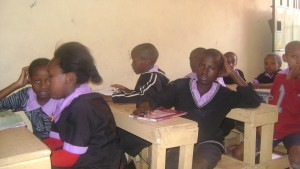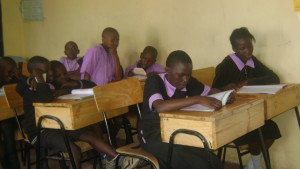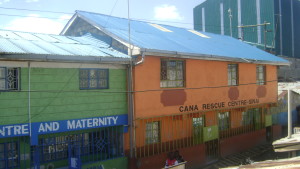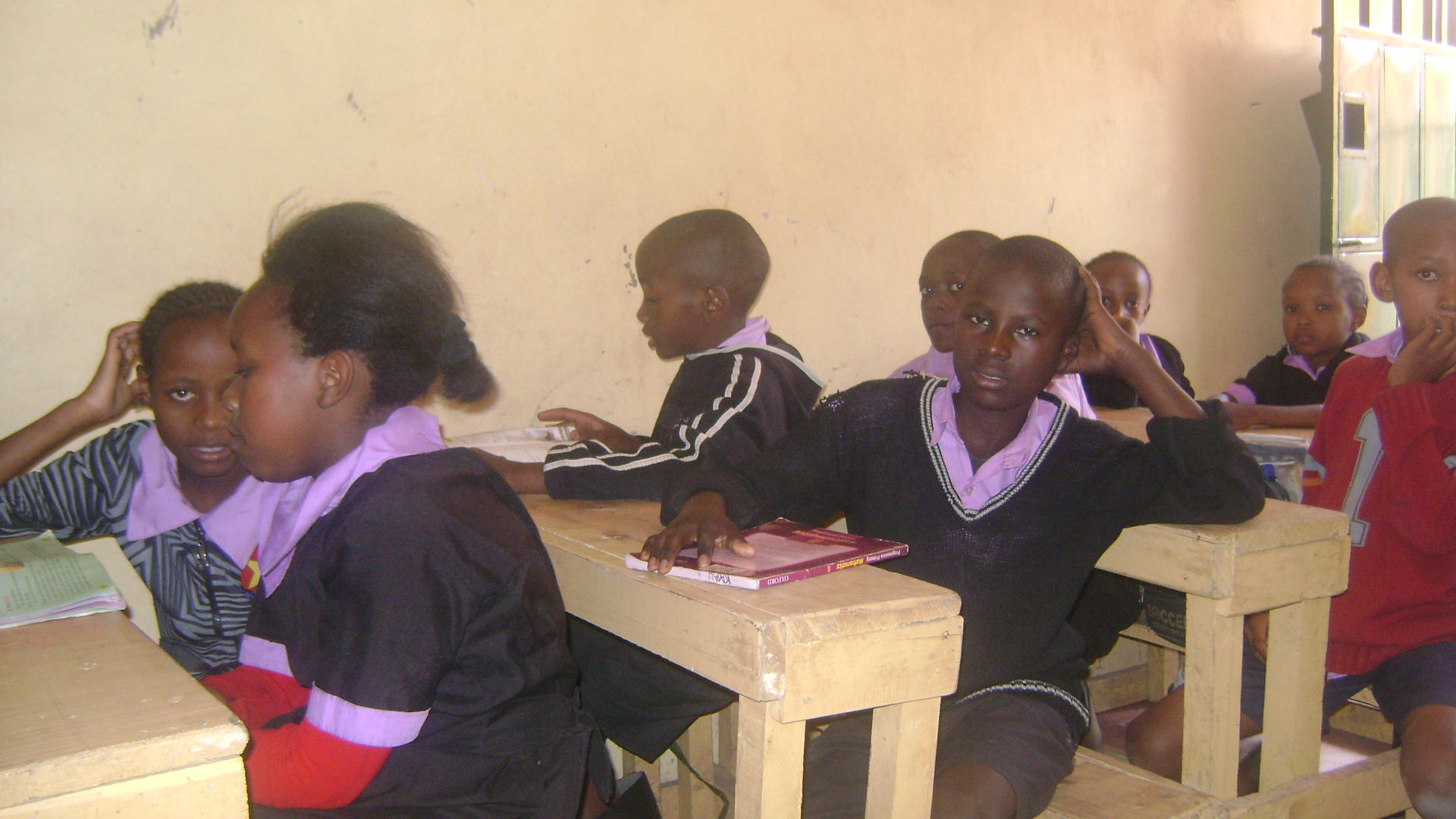By Clifford Akumu.
“Difficulties in your life do not come to destroy you but to help you realize your potential and power.”These are humble words that clearly fit Catherine Awuoche.
A 13-year old charming girl has been through hell and back.
When I met her, she was engrossed in her book at the corner of the classroom reading for mid term continuous assessment test.
Unlike her classmates who forgot what they were doing immediately I entered, and started asking whether I was their new teacher, Awuoche stuck to her chair.
Initially I thought she was shy, only to be shocked when she opened up to talk.
“I have to study hard since I want to become a news anchor” she smiles
Another girl, Betty Edendwa tries to tease her classmate as the ‘happy family’ breaks into bouts of laughter.

Betty is well known for her talent of ‘mchongoano’, loosely translated as ‘teasing each other’, as I came to learn.
Awuoche and her friends are part of Cana Rescue Centre, a charitable organization that takes care of the abused, orphaned and vulnerable girls in Sinai slum-Nairobi County.
Before she joined the centre, Catherine and her brother lived with their uncle in the slum.
Things did not go well since their uncle used to roast maize to make ends meet.They would go for two days without food, she remembers.
“At some point my uncle had to spend the night out in Gikomba market to wait for maize. On a bad day he would come home without anything and quarrel us for being a burden to him” she says while in deep thought
In order to survive, they started looking for menial jobs around the slum and as far as Donholm Estate.
They would ‘hit the jackpot’-as she puts it, in early 2009, when they got a well paying job.
“We had gone to this household where we were told to take care of the baby and do household chores.
“Since I was still young, I would be left with the baby as my brother washed clothes and scrubbed the floors. We were paid around Sh200”she recalls
That day, we had what we would call ‘Christmas celebrations’ and our uncle became proud of us all over sudden.

But like they say, you can’t be lucky everyday; we had to go back to our usual routine.
They had to cruise the muddy alleys of the rusty tin shack houses in the slum to look for food as they pondered their next move.
Slum life, at some point, she remembers felt like the grim reapers sanctuary.
UNICEF data in monitoring the situation of Children and women indicates that around 150 million children worldwide are engaged in child labour.
In least developed countries, nearly one in four children (ages 5 to 14) are engaged in labour that is considered detrimental to their health and development.
During one of her routine search for baby sitting job, Awuoche saw a group of children enjoying food at a church compound.
Being curious and buoyed by the pangs of hunger, she forced her self inside to eat with the children.
The drill, she recalls, was crystal clear “Ukimaliza kukula, Uende nyumbani sawa-“Make sure you go back home after eating”.
She thought where would she get that kind of meal, even if she went back home?
Awuoche defiantly refused, until a social worker at the centre intervened.
“When one of the social worker walked in with Catherine into my office, I knew I had to do something” says Mrs Mary Mambo, founder Cana Rescue Centre.
And that is how Awuoche ended up at the centre in 2012, what would become her home.

The centre has been housing 50 abused, orphaned girls and boys for the last 10years from the slums of Mukuru-Sinai, Viwandani, Kwa Reuben, Kwa Njenga and Kayaba.
A delicate case like Awuoche’s, she says, needs a lot of counseling in order to stabilize her situation. This came at an opportune time, thanks to a full training she attended at Daystar University.
“Most of the children here have, in one occasion or the other, been abused by their relatives largely because of the kind of living conditions. We deal with serious cases of abuse to make them feel part of the society again” explains Mambo
According to her, the program considers orphaned and vulnerable children (OVC) particularly girls, however, pressure from the slums has forced them to change tact.
Thomas Odhiambo (nicknamed Tom by his peers), is among the boys who have changed their life for better.
Now in class six, the 12-year old boy is happy to be in school.
“I used to wander about in the slums and sleep wherever darkness fell. Now I have a home.” says Thomas adding that he has never seen her mother for a long time.
He was informed by his uncle that the mother is bedridden just before he joined the centre in 2012.
“I get food, clothes and good education, that is what I am proud of” says Thomas
According to United Nations Children’s Fund(UNICEF) and the Joint United Nations Programme on HIV/Aids(UNAIDS),there are 48.3 million orphans south of the Sahara desert, one quarter of whom have lost their parents to HIV/Aids
Kenya alone is home to 2.3 million orphans occasioned by Hiv/Aids.
Living at the centre has made Betty Edendwa, who used to stay with her grandmother after the parents succumbed to HIV/Aids, to liken it to her ‘home’.
Her grandmother, Erika Edaya, in her early 60’s, could not take care of her after being sick.
“In 2007 my grandmother too became sick and my world literally crumbled .” says the 14 year old class 8 pupil
Edendwa, who by then was attending Baptist Primary school-Viwandani, had to quit.
“I joined the centre in class four, thanks to my grandmother; today my hopes of becoming an important person in the society has been raised” says Edendwa
Worried about the status of girls at the centre, Mambo had to come up with programs on educating teenage girls on life skills and early pregnancy issues.
“These girls are at their critical stage in life; hence maintaining them becomes a challenge. We have to make sure they are having all they need such as sanitary towels, body lotions and nice clothes” notes Mrs Mambo
In addition, for those with HIV/Aids, we provide them with good nutrition, proper care and put them on ARV’s.
“We have to give them a life because they deserve a better tomorrow just like their peers.”
However, it has not been rosy for Edendwa and her peers at the centre for they have to portend with lack of water.
Buying water for three days a week has been very expensive, says the founder of the centre.
“We buy around 300 litres of water from the vendors at around KSh3, 500 because what we get from city council is not enough to operate on. We have to provide clean water and sanitation for the children” says Mrs. Mambo, who is also the director of the centre.
With the skyrocketing cost of living, the centre has to rely on well-wishers a situation that is not ‘always guaranteed’.
“When you wake up in the morning and you are told there is no unga for supper, you feel like praying so that the earth can open and swallow you”
“You have no choice but to stay and save them because this is a calling” she explains.
Basic education is a right that parents should accord their children as enshrined in the constitution.
Statistic shows that only one third of Kenyan slum girls go to school and opposes one of the African proverbs – Educate a boy and you educate an individual. Educate a girl and you educate a community.
Even if they get a chance to enroll in schools, approximately 65% of them drop out before completing Standard 8
“Children are very important and the future of our nation let’s take care of them because they are a gift from God. These girls have really improved, they are now sure of a bright future” says Mr. Bernard Rop, head teacher Cana Centre
With almost 50 per cent of girls aged 14 and above succumbing to early pregnancy in the slum, the likes of Awuoche have been cushioned against such predicament, albeit, for a good period.
“I know there are so many girls out there who are in dire need, what I can tell them is that they should not lose hope because they will one day get somebody like Mrs.Mambo”says Awuoche.
Being among senior nurses in 1995 to be licensed by the government to practice as private clinics, she took the gamble and opened her station in Donholm Estate.
While practicing, I used to meet children who would be stationed around the clinic asking for money.So,one day, I decided to visit them in the slums, what I saw made me think twice.
“I felt a burden in my heart because I could not concentrate at my work place. I sold the house we had in Buruburu Estate and my car to raise some cash to start a clinic in the slum
Although she was doing very well at Donholm, she saw the need to help the children. That move, she says, has made a difference in his life and that of the children.
She continues, “I started with a day care centre where children were offered food and went back home. I was shocked when I met some of them in the streets again. After listening to some of the stories, I new there was a problem”
Mrs. Mambo says that it is painful to realize that a lot of resources allocated at the county level are returned to Treasury for lack of commitment.
“This country has a lot of money but nobody is willing to help the poor children. Imagine if every able household could just pick one street child and give them education, this will be a prosperous society”
However, the centre has put in place measures through which the girls get time to visit their relatives during holiday season.
But a lot of caution, she says, has to be factored in before they are sent home.
“We first ask them if they are safe back at home before they are released, for those with relatives in the slum” says Mambo.
As the world marked the Day of the African Child, Awuoche and other girls from the larger Sinai slum were beaming with joy too.
“I celebrated the far I have come and gave thanks to God, I don’t know where I could have landed if it were not for Cana Centre.” Awuoche appreciates.














